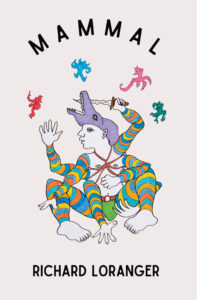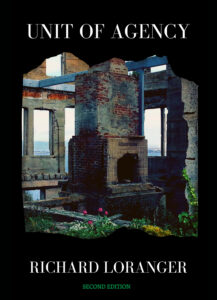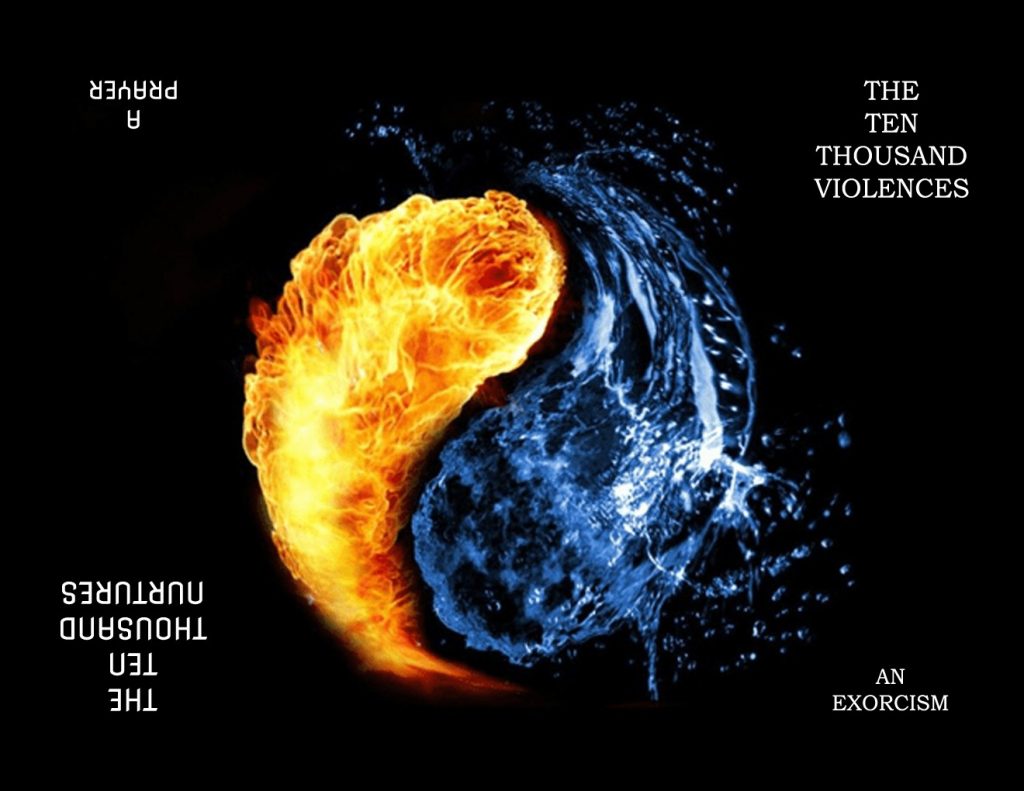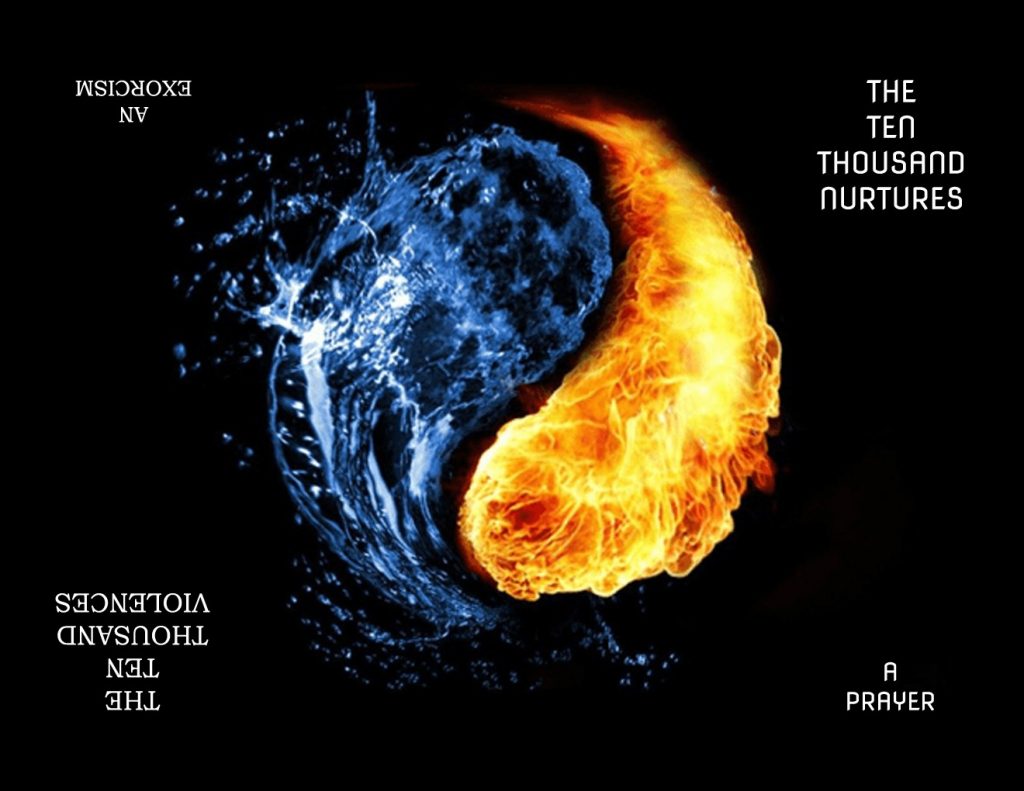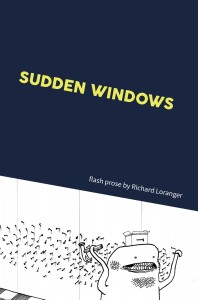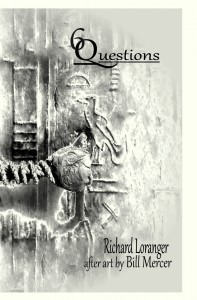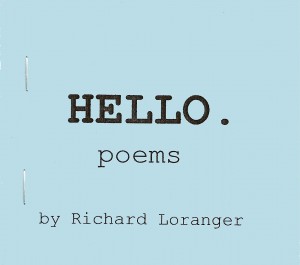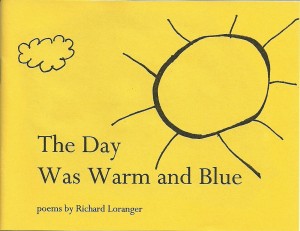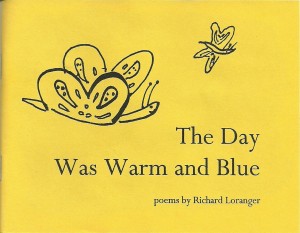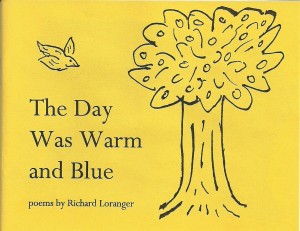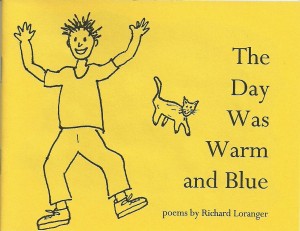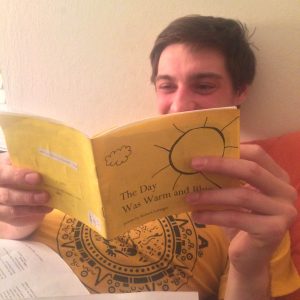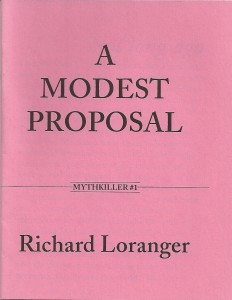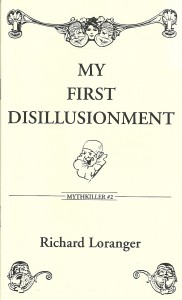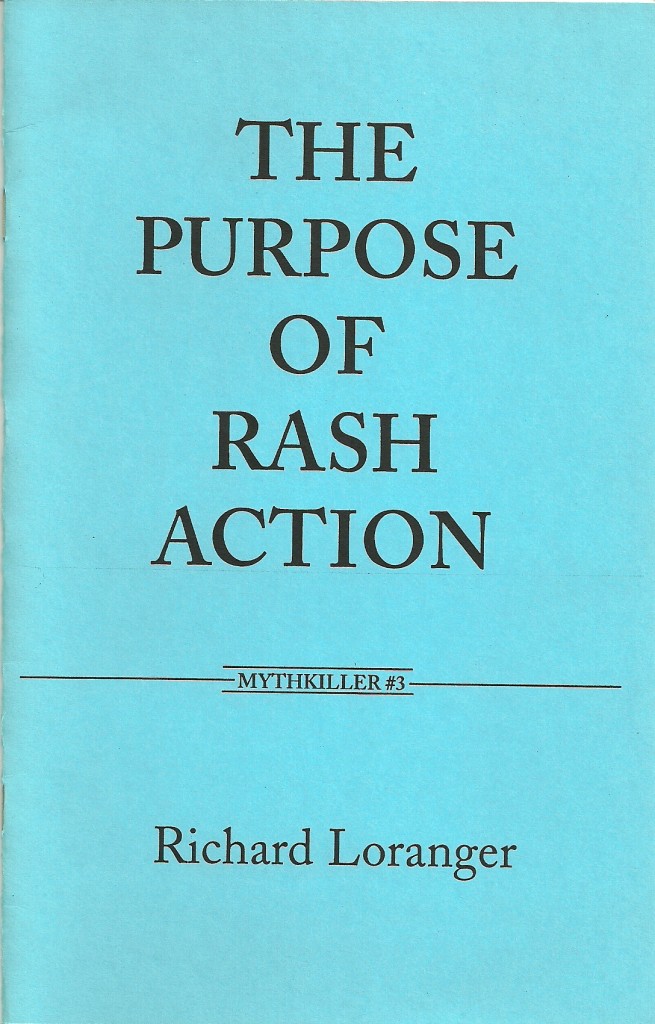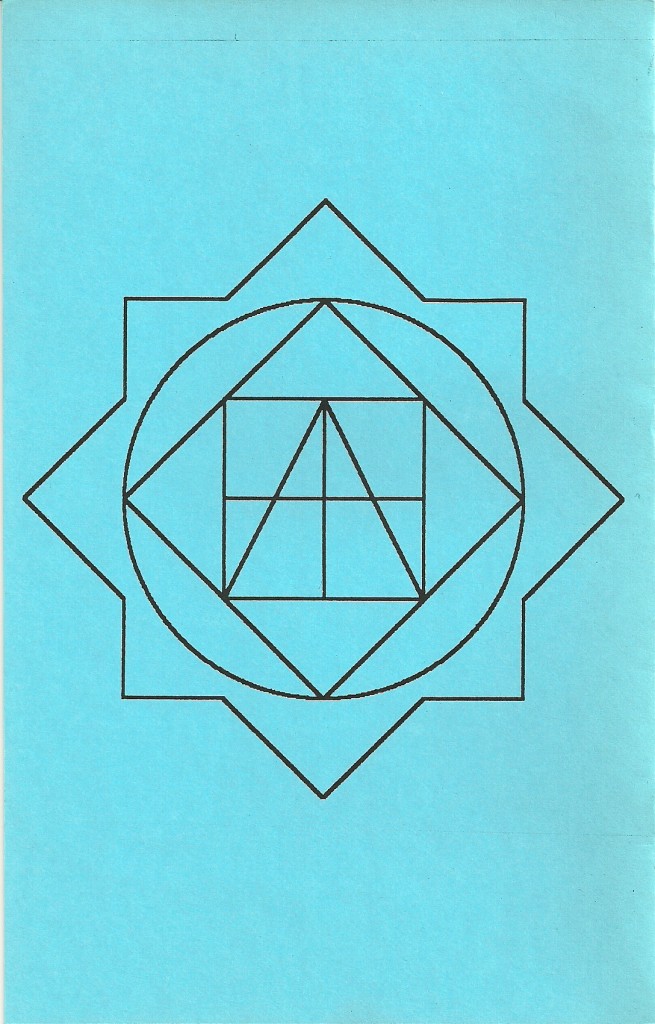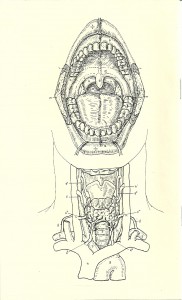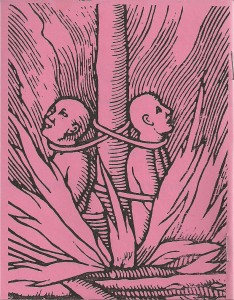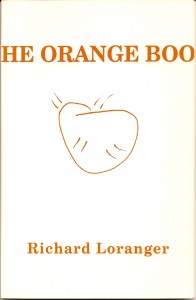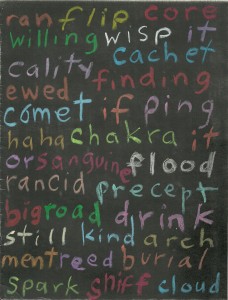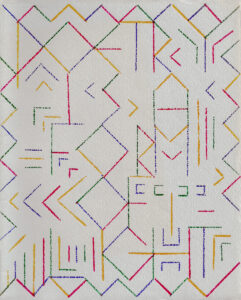.
.
Mammal
.
.
Roof Books, 2023
ISBN # 978-0-937804-91-9
paperback, 128 pp., $20
available through Small Press Distribution
RELEASE DATE: September 1, 2023
.
Verrrrrrry excited to have this collection of poetry and flash prose released through Roof Books. It’s been a long time in the stewpot and contains quite a few newer pieces along with a strong selection of “greatest hits” that have never appeared in book form. Now you can have “Mud Song” forever at your fingertips! Not to mention “Bootism”, “Poems for a Centralized Church”, “nameless, unreasoning, unjustified clarity”, and many more. The first section of the book, What It’s Not, might give you a clearer sense of how I experience life, which is kind of as a fluid…everything. It also, by the way, acts as a bit of a primer for how to view the rest of the pieces in the book. I so hope that you enjoy it.
FROM ROOF BOOKS:
Mammal is the latest collection of poetry and flash prose from legendary Bay Area rebel Richard Loranger. The book is grounded in a poetics of reexamination and the consistent questioning of the nature of most everything. Starting with a delve into the poet’s experience of fluid gender, identity, and self, the work expands to explore protean perspectives of culture, institutions, sex, relationships, self-reflection, and American life, carried by a distinctive and gleeful language-play and stylistics that push the boundaries of connotation and embrace a plurality of meaning.
Mammal posits new ways of understanding ourselves in relationship to our own minds, others, and the natural world. Ever the juicy provocateur, Loranger challenges the reader to consider that “you’re not really you” and that the “I” might be “a mirrored room / we build around ourselves without a door.” This presents a unique nonbinary and trans* transgressive intransigence, exploding thresholds through a hybridized continuum of approaches inflected with post-Beat neoformalism, spoken word cadences, queer disruption, conceptual audacity, and raucous experimentation.
Loranger construes radical new perspectives on posthumanism. Behold the “stark hubris of the poor enamored beast / flailing its way through the veldt of itself / as if the skin were true.” Interrogating “the id of it all,” we’re upbraided: “Don’t tell me what I am. You’re wrong.” In these pages, conventional conceptions of gender and sexuality melt like ice cream on a hot day as “we slide like pudding into history.” Discover Richard Loranger for yourself with Mammal!
.
With beautiful cover art by Tobias Brill.
.
What Folks Have to Say About It
Hey ho! Yo hey! Exuberant, surprising, with a wondrous juggle of words, Mammal is also compassionate and often deeply touching. Richard Loranger has written a beast of a book—a ground-shifting, prance-twisting, song-filled, and yes, friendly beast. Take a deep breath, hold on, and join the dance. Ho hey!
— Jane Ormerod, artist, author of Welcome to the Museum of Cattle and Recreational Vehicles on Fire, and founding editor at great weather for MEDIA
.
A timely gift to us, Homo Sapiens, when our overall identity seems to be blurred & lost. Written in direct & humble language & with the most personal & natural breath, Mammal is a lullaby, a hymn & a whimsical gospel of our time. It mirrors us with a clear reflection of who we are to wake us up to the vital sense & sentiments of the origin of our species.
— Yuko Otomo, visual artist and author of STUDY & Other Poems on Art
.
I avidly look forward to each new Richard Loranger book. They have a very distinctive poetic voice, and it is on full view in Mammal. Equally persuasive on the subject of butterflies, pronouns, or insomnia, Loranger takes us all on a wild ride through levels of understanding. “As long as we think we’re our bodies / we’re fucked,” Richard offers, and it would be ungrateful to disagree.
— Kim Shuck, 7th Poet Laureate of San Francisco Emerita and author of Exile Heart, Deer Trails, and Sidewalk Ndn
.
.
Unit of Agency
.
Collapse Press, 2021
2nd Edition, 2024
Introduction by Lonely Christopher
ISBN # 978-1-7352669-1-6
paperback, 92 pp., $20 (1st ed.) / $15 ( 2nd ed.)
available directly through Collapse Press and Amazon
RELEASE DATE: October 29, 2021
2nd EDITION RELEASE DATE: November 16, 2024
I’m honored to have had my manuscript Unit of Agency chosen to be the inaugural publication by Collapse Press, an endeavor begun early this year by Paul Corman-Roberts and E. Lynn Alexander. It’s a collection of poetry and short prose that I like to call human struggle/protest culture/pissed-off leftie pieces. Whatever they are, I suspect that readers of many sorts will find the work to be provocative.
The Second Edition, released in 2024, is reformatted and typo-free, and contains five additional poems for $5 less. Yay!
FROM THE PRESS: Unit of Agency is a full-length collection of poems by Richard Loranger, one of his generation’s premiere cutting edge performance poets, an artist who writes for both the stage and the page with equal ambition. In this collection, Loranger brings his considerable experience as an activist, organizer, and provocateur to bear on the effects of Late Capitalism on communities and culture; the divisiveness of the American political circus; the dis-ease of finding our attention occupied by nationalism, racism, and hatred; and the value of shifting perspectives as an approach to optimism and action.
Cover photo: “Warden’s House at Alcatraz, 2015” by Richard Loranger
Cover design by E. Lynn Alexander
.
What Folks Have to Say About It
Richard Loranger’s poetry embraces the mammalian condition in all its contradictions, dangers, and beauty. Despite the rampant sublimity of his verse, it’s implicitly political. The imploration that “we have to become human” recognizes a moral imperative for resistance, actively confronting a sociopolitical infrastructure explicitly designed to alienate us from our communities and ultimately ourselves, detach us from our responsibilities, become consumerist screens, dissociatively labile.
Loranger prescribes no concrete answers but architects ramshackle systems of thought through which to jostle and unhorse our indolent prejudices, reach out for something more, find the materials to start building.
Late capitalism consumes so much energy but generates no light, only heat. A leader that cares about their nation is a Whitmanesque fantasy. Corporations are both immortal and granted legal rights of personhood. Bureaucratic systems of service provision are suffused in the language of surveillance. Capitalism is “eating itself from the inside” without the awareness that, like a virus, it is destroying its host. Amidst this dangerous circus, the poet is “daggered and sliced” by an absurd reality but remains undefeated. Perhaps these poems find Loranger at his most cynical, yet he can’t surrender the drive for healing.
— excerpts from the introduction by Lonely Christopher
.
Unit of Agency is a gift of the tenderest rage, rage at its most righteous–against injustice, against inequality, against homophobia, against colonization and gentrification, against the dying of the light of humanity and human kindness. Through his poetry, Loranger reminds us that none of us escapes this life innocent or unscathed. We are bruised and broken with blood on our hands, but we are also together. It is not a bleak view. The riches that capitalism and greed have stolen from us, Loranger gives back with poetry that is rich visually, auditorily, and, most of all, emotionally. These works are both ammunition and imperative. This is poetry that matters.
— Hilary Brown, author of When She Woke She Was an Open Field
.
I adore Richard Loranger’s poetry. His work travels deep within and out into the world, spotlighting our connection/disconnection with the earth and our highest selves. Be it celebrating nature or exposing the malice of MAGA America, Loranger places the human condition under the poetic microscope and grapples with how to make peace with our alternately magic and savage selves. He not only reveals a world where we are stuck between home and hard places—such as sorrow, jealousy, and racism—but also shows us how poetry can transform strife and oppression into a healing lyrical medicine.
— Rich Ferguson, State of CA Beat Poet Laureate (as selected by the National Beat Poetry Foundation, 2020-2022)
.
Sharp and incisive, Unit of Agency cuts to the bone, echoing what’s always been present but shifted to the shadows. Balancing irreverence with an unflinching eye, Loranger pens anthems for the rebel hearted everyman and declarations against MAGA’s with bloody knuckles. Here is where we find what guts are made of: grit and determination.
— Dena Rod, author Scattered Arils and swallow a beginning
.
Richard Loranger is a wry and inventive poet with a deft touch. His collection Unit of Agency proves him a language alchemist revitalizing words and infusing them with blistering new energy. “I don’t know what any of this means,” he writes. “Because this isn’t about meaning. It’s about being. It’s about doing. It’s about living.”
— James Cagney, author of Black Steel Magnolias In The Hour Of Chaos Theory, winner of the PEN Oakland 2019 Josephine Miles Award.
.
When I tell you everyone needs to read this book, I mean it in the most genuine way possible. Richard comes right out of the gate with nails sharpened, teeth bared, words bloody and beating with that thump we tend to get far too used to. He writes with heart, with fire, he pulls back the smoke screen and says WE NEED TO GET IT TOGETHER. I think we could all use that wake up call sometimes, no?
There’s a certain pull this book has; Richard is the firefighter in the burning building we call our world. The imagery he uses is not flowery, but it’s exactly the kind of road block that stops our crashing car from careening off the side of the road. This work is important, it’s never been more needed than it is right now. Richard is a worldshaker and a wordforsaker, a force to be reckoned with but only if you think you’re ready for it. So be ready, dive in, and let Richard wake you up a little bit. It’s a better stimulant than coffee ever will be.
— Han Rashka, author Splinters
.
Richard Loranger’s poetry is an exhilarating and dizzying bouillabaisse of seminal psychosexual seriousness and silliness. He is optimally prime in his moment to moment transformation, construction and deconstruction of what we might be, what we could and what we is. Unit of Agency is a new pocket universe on every read and I look forward to every trip back.
— Juba Kalamka, author of Son Of Byford, member of “homohop” group Rainbow Flava, co-founder/producer of Deep Dickollective (D/DC), and developer of the micro-label Sugartruck Recordings
.
And from the designer
The cover features a photo taken by Loranger of the Warden’s House on Alcatraz, with the East Bay in the distance and plants in the foreground- having pushed their way through the crumbling remains. These contrasts of new and old, growth and deterioration, life and death… past and present… are the first suggestions of the themes within. Loranger has combined both new and old pieces of poetry and prose, so the writer of each page has been a different writer, at different points. Like all writers who have been at this for many years, we see a changing world through changing eyes.
Loranger describes the project this way: “Unit of Agency is a collection of human struggles/protest culture/social justice/pissed-off leftie poems and short prose pieces from the last few years along with some classics.”
The significance of the house in historical context should not be lost on the reader. We see the heart and hearth of the house where the Warden knew sanctuary in a place designed to contain the detached imprisoned without respite. The sea beyond the walls, the bay, constitutes a realm of possibilities that a Warden could take for granted surrounded by people who could not. One wonders how many inmates at Alcatraz viewed that same sea through the windows, the sea as barrier.
I imagine that the sea, stretching away from the island, and the constant presence of the sea sounds would have been an inescapable reminder of the separation. Prison cuts ties with one’s life and loved ones, often the most important relationships are lost. The barriers, by design and intended to punish, can be a source of spiritual torture without reprieve from that anguish. Every night, the sea reminded them of their apartness.
I think about the warden, the “master of the house” and island, in that house. Was it beautiful then? The flowers and vines persist, they have pushed to be in a place where they don’t belong.
— E. Lynn Alexander, co-founder, Collapse Press
.
.
Be a Bough Tit
.
Be About It Press, 2020
ISBN # 978-0-9986012-5-0
paperback, 64 pp., $10
available through the author, Be About It, and Amazon
RELEASE DATE: November 21, 2020
.
FROM THE PRESS: Be About It Press is proud to announce the publication of a new collection of poetry by Richard Loranger, titled Be a Bough Tit. Looking around at all of the hard-bitten, angry titles and work that’s been emerging of late, and for good reason, we thought it would be an excellent time to release a collection grounded in joy, whimsy, and hope as an antidote for the age in which we’re living. Though not without its dark corners, this book shows a personal, plainspoken side of this accomplished writer which, when challenged, strives for the positive. The title itself, purposefully a pun on the name of our press, speaks both to the type of language-play in which Loranger revels, and the sheer exuberance of seeing life as a strange, alien creature in song: a bird on a bough.
With cover art by Jim Naughton.
What Folks Have to Say About It
In Be A Bough Tit, Richard Loranger has created funny, philosophical and profound odes to everything from coughs to colonoscopies. He waltzes into the minds of animals, insects and inside the marrow of human bone, “into the molecules holding the bone together, whipping around, vibrating, full of vast empty space…” Loranger’s poems touch us like “silk sand mist wind flame..” and in subtle ways inspire change.
— Wanda Phipps, author of Mind Honey, Field of Wanting: Poems of Desire and Wake-Up Calls: 66 Morning Poems
Be a Bough Tit…is a form of alchemy, spinning shit into gold, finding a light, meeting the worst and giving it your best. The poet declares: “My heart breaks and then there’s no fucking room there’s no fucking room for injustice or pride there’s a riveting single gong of a bell and then life endless stretching forward through streets and reeds and there’s no goddamn place for wrong for discourtesy for disrespect for mistreatment for dispassion for harm of any sort for my heart breaks.” Taking risks is “a way to become more human,” in the interest of existence, at a certain point one must insist: “Fuck the ideologies. Let’s have a world.”
— Lonely Christopher, author of Double Rainbow, In a January Would, The Resignation, and The Mechanics of Homosexual Intercourse
Richard Loranger’s Be A Bough Tit is an affirmation in dark times, it is a reminder to live, to notice the small pieces of beauty when it feels like it’s all burned up. Be A Bough Tit brings lightness to a time of dark poetry. While we have written of our abusive relationships, abusive politics, pandemics, and oppression, Loranger reminds us to celebrate. He starts with a play on words and sounds with the title. He’s taken the name of his press (Be About It) and turned it and us into the joy of a bird on a branch, from there we are reminded to sing and soar.
These poems force us to look so deep inside we are staring at our own marrow, we are talking to our own cells, and those of the fruit flies that harass us. This collection is like quarantining in solitary while travelling the universe—without stepping outside, it’s a guide to get us through these tough times while timeless in the delicious and irreverent morsels he feeds us.
— Cassandra Dallett, founder of Badass Bookworm and author of Collapse and A Pretty Little Wilderness
In this book Richard’s imagination goes everywhere at once, and brings you there. You’re there in the feast of flowers, the universal purpose of a fruit fly, in his overwrought refrigerator. He’s got one simple rule, which is perfect, and impossible to follow. These poems make sense, like life makes sense, or not. They’re fun, and impossible, and inventive, and I love them.
— Bruce Isaacson, Founder of Zeitgeist Press and Emeritus Poet Laureate of Clark County, Nevada
Richard Loranger’s charming chap-book is a cornucopia of list poems, concrete poems, odes, prose poems, imperative poems, and economical gnomic utterances. The unifying subject matter is wide and apropos: what it means to be human and to exist in this world.
— Natasha Dennerstein, author of Turn and Face the Strange, Exit, Diva, and Seahorse
.
.
The Ten Thousand Violences / The Ten Thousand Nurtures
.
chapbook, 16 pp., $10
available through the author
.
RELEASE DATE: December 13, 2019
.
.
This handmade book contains two pieces of non-literary spiritual writing, which I call an exorcism and a prayer, that I produced at the end of 2017, as a means to temporarily purge the violence of the current administration, and seek a little healing. I’m told it’s intense. Maybe it will help you as well.
.
.
.
.
Sudden Windows
.
ISBN # 978-1-940572-06-2, paperback, 100 pp., $15
available through Zeitgeist Press and the author
(no distributor, but hopefully on Amazon too)
RELEASE DATE: June 19, 2016
This new book of flash prose contains 85 pieces resembling rectangles – unless you fall into one, of course, whereupon you’ll be briefly in another world. Prose poems, vignettes, mini-rants and diatribes, call them what you like. We call them windows.
With cover art by the fab Drew Morrison.
What Folks Have to Say About It
Selected comments by Heather Lang in The Literary Review
Loranger’s attention to image in his writing, to what concretely appeals to the senses, is impeccable. The “trees drink clouds,” “we chant ballyhoo and balderdash, while ants and snakes overtake our homes,” “and who knows what will fall from the sky. A pie, perhaps, a piece of Tupperware, a single blade of grass.”
. . .
Of course, prose poems are not uncommon, but Loranger’s title choice, Sudden Windows, and his decision to label these pieces “flash prose” heightens our senses to the form. Unlike static snapshots, through windows we can witness the various events that make up a minute, an hour, or longer. They move beyond the stillness of a portrait and the implied narrative of an action shot.
. . .
Sudden Windows also offers hope in the endless spread of possibilities it explores throughout its dozens of pages. For example, the final two sentences of “Use Your Eyes” demonstrate the collection’s juxtaposition and balance: “Everything tastes like heaven. I eat my chicken like a savage.” When there is sorrow, there’s joy. Where there’s confusion, there’s clarity, too. Hopelessness is tempered with hope, and if you’re on the brink of change – and this is constantly true for all of us – you might find that “your face breaks into bloom. Why? Because it can.” What, exactly, are we to do about this? To again borrow the words of Richard Loranger, let’s “let the baby run wild.”
— Heather Lang is the Associate Poetry Editor and Managing Online Editor of The Literary Review
— Click here to read the full review.
You can sing these words, or stop and feel them. These pieces are big, mind you, Loranger is giving you some options. They are not crossword puzzles for the recoil of lush indignation. They are about a death in the family, a life in the family, and a call to spin, rustily and noisily, through this stint on earth, trying not to plagiarize emotions or listlessly cover hits.
— Jennifer Blowdryer, author of Good Advice for Trendy People of All Ages and The Laziest Secretary
Reinvention is overused. Delving is boring. So how does a poet sing, now, in the 21st century, as the earth is winning the war against humanity?
Loranger writes in Sudden Windows, “Why can’t we speak of falling leaves? You can have your economics and your ironies, but can you live without the fall? How many acorns need to drop on your head before the crumbling leaves become your heart? You may speak of preciousness…but this is the eternal fugue, my friend, an eddy, a year, and you can no more shun the river than you can not fear.” Loranger is no innocent bystander. He becomes one with the earth as with a lover’s body. He tussles and then melts into it until we feel his bones turning to ash.
To my mind, the prose poem has never had a more adept practitioner. Echoes and enjambment, like the eddies themselves, drift and float throughout the text. Add a pinch of anger, a tablespoon of despair and a cup of rage and you have a book that, shot out like a rocket to space, shall endure through the ages. I’d like to read this book in heaven.
— Joan Gelfand, author of The Long Blue Room, A Dreamer’s Guide to Cities and Streams, and the award-winning Here and Abroad
Absolutely beautiful. Thoughtful, methodical, the images stunning and guiding hand, soft palm on shoulder, feathered layers, warm sheets, smile. Thank you for allowing Sudden Windows out into the world.
— JK Fowler, founder, Nomadic Press
.
.
6 Questions
.
ISBN # 978-0-9898984-0-9, chapbook, 20 pp., $11
available through Exot Books and the author
The Questions Project began in San Francisco in the 1990’s as collaboration between artist/musician/poet Bill Mercer and poet Paul Landry. Bill began by producing a number of calligraphic artworks using brushes and ink, each of which represented or suggested a question mark in some way or another. Paul responded by writing a poem for each piece which addressed, described, or depicted a question that each piece of calligraphy suggested to him. In the years since, Bill has created literally hundreds of such pieces, to which dozens of poets have responded.
This book represents one such response, with reproductions of the calligraphic works by Bill Mercer presented aslongside the reactive poems by Richard Loranger. In this case, Richard created a series of six poems, each of which both asks a question and depicts a specific type of questioning. He considers the title of each poem to be the accompanying artwork itself.
.
.
Poems for Teeth
.
We Press, 2005
ISBN # 0-9725663-2-5, paperback, 214 pp., $16.95
available through We Press, Amazon, and the author
.
What Folks Have to Say About It
Richard Loranger’s Poems for Teeth is an artistic marvel. In addition to extraordinary poems, the book contains calligraphic representations of each poem prepared by the author and artist Eric Waldemar, and musical scores and notations for songs within the poems. A diagram that charts the identity of each tooth appears at the outset, so that the book functions hypertextually as well. The volume [is] what poetry should be: a multimedia tour de force.
— Chris Funkhouser, publisher of We Press and author of Prehistoric Digital Poetry: An Archaeology of Forms, 1959-199
.
When it comes to poetry – and believe me, it takes a lot to come to poetry! – obsession knows no bonds, bounds, nor excesses. Case in point: This Loranger…. So now, of course, we have Poems for Teeth, where every tooth gets its own poem, in one of the most extraordinary and virtuosic poetic feats since Francis Ponge took on Soap (1942-67). Ponge on poets: “They know how to hide, to dissimulate their usefulness.” Wrong. As the extraordinary poems in this one-of-a-kind venture by a one-of-a-kind poet unwind, the Reader’s Mind gets a much-needed deep flossing, unhidden and totally useful. Richard Loranger is another word for Blessing, and this book is another piece of evidence. I treasure it.
— Bob Holman, author of The Collect Call of the Wild, co-editor of Poetry Nation and United States of Poetry, owner of Bowery Poetry Club, NYC
— Read a fuller blurb by Bob in “Poetry Picks: The Best of 2005” on About.com..
Nothing quite prepares us for Richard Loranger’s Poems for Teeth, a book of poems unlike any other. Occasioned by a severe jaw infection and the resulting dental surgeries, these “crazy odes”, “thank-yous to my teeth”, he calls them, are meant both as acts of remembrance and restitution. Little lamentations for what is lost, poems of praise for what remains, they sing through their teeth, as it were, the tender, sad, sorry, outrageous comedy of our mortality. And each is brought to us in radiant and goofy word-riffs, arpeggios that ring the rich changes between jeremiad, scat-song, nursery rhyme, elegy, ode, gospel, gloss, glossolalia…. “The teeth are 32 parts of speech,” Loranger writes. “As long as there are teeth, there is language.” Between the blind bruxisms of the daily grind and the brilliant luxuries of the delighted spirit, mind, his words take wing – “Watch that eye tooth shine!”
— L. S. Asekoff, author of Freedom Hill, North Star, and Dreams of a Work
.
My favorite mammal Richard Loranger now lives in the Bay Area and writes the best undiscovered poetry in the universe. His verse chews around the human condition in an articulate and ticklish way. As I said in an old article for my press blog (which features a poem he wrote in celebration of my college milieu of burgeoning writers), ‘Many lesser poets have or attempt Richard’s unbridled energy, but few possess the same exquisite formal ability that turns electricity into something diamond-shaped.’ Do yourself a solid and track down his perfect debut collection Poems for Teeth, and fall in love.
— Lonely Christopher, author of Wow, Where Do You Come from, Upside-Down Land?, Gay Plays, and The Mechanics of Homosexual Intercourse
— To read the article “Richard Loranger, Mammal of Verse” by Lonely Christopher, click here..
Loranger specializes (if we can even use this word) in series poetry, so the book Poems for Teeth etches its niche through teeth, all the teeth in a human mouth, and each tooth tells a story, sings about life. Before long the poems cease to be about teeth. In some tooth logic the poems reach out and grapple with other realities–exhibitionism, absurdity, or the politics of nations, to pure entertainment, when the poet breaks into song.
— Emmanual Sigauke, Sacramento Poetry Center
.
I who can easily turn on beauty, sincerity and truth, can safely say I enjoy this poem. Why? It’s readable:
looks at flowers and seesflowers, not the monsters they’re cracked up to be
can’t be rained on,
plays the pretty little butterfly-man
child child not child
Or:
What livesafter so much fury?the poor dwarf stands before the altar,
hands fluttering at his sides,
face numbgone fucking lost
But, I know nothing if I don’t understand the language here, focused and unadulterated, certainly it’s a dream, a landscape wrought of the mouth, our most vulnerable frontier, he suggests almost politically speaking asking in his introduction if health insurance should be a luxury.
Loranger has much to say about these places he’s been and you’ll recognize them one after the other from Elysian Fields (Santa Cruz?) to the scenes of more contemporary crimes, Bagdhad (NewHaven), any urban mix up of lives and concrete, torn by sound, and of course also where the lyric resides. I see in this work some of our contemporaries: Nate Mackey, Tony Kushner, Marianne Faithful, and then those before, Keats, Yeats, Crane, Duncan, Ginsberg.
A beautiful read. I’d like to hear it of course at Yankee Stadium, lights down, the sounds of the city filtering in…
— Katie Yates, author of poem for the house and Letters: 29.IX.95-9.X.95
.
.
Hello Poems
.
We Press, 2003
chapbook, 67 pp., $5ppd
available through We Press and the author
Spurred by brief conversations that Richard Loranger was having with invisible people in his shower, Hello Poems (a.k.a. Hello.) document a nine-month exploration into what it means to say – you guessed it – Hello. Considered by some to be Loranger’s most political work to date, this unusual and delightful series of sixty-seven short poems will certainly give you a new perspective on the nature of the greeting, one that will give you pause and let you crack a smile in the same breath.
What Folks Have to Say
The dozens of short, deceptively-simple poems in Richard Loranger’s Hello Poems are funny, witty, and thought-provoking. In Hello, Loranger offers us nothing less than a rollicking, no-holds-barred conversation with the universe.
— Mary Mackey, author of Sugar Zone, The Widow’s War, Breaking the Fever, and The Earthsong Trilogy (all available on her Kindle e-books page)
I love the way it sets you up with these simple exchanges and then out of the blue whams you with profundities like “I’m shackled by truth and beauty” and then goes right back to the mundane: “That doesn’t sound good.” Really an eye-opening book that shows how much can be done with the simple verbal exchanges we mostly don’t pay attention to.
— Gerald Nicosia, author of Memory Babe: A Biography of Jack Kerouac and Jan Kerouac: A Life in Memory
HELLO made me so happy. Startled me into happiness, my brain was happy, my feet were happy, my elbows happy. Poetry can also do that.
— Nona Caspers, author of Heavier Than Air and Little Book of Days
Hello Poems is a collection of truly enjoyable miniature conversations on the subtle tensions, pleasurable reliefs, and humorous problems that exist in the way our words collide with each other.
— Richie Rhombus, artist and provacateur
.
.
The Day Was Warm and Blue
.
.
.
.
.
.
.
.
.
.
self- published, 2002 — chapbook, 28 pp., — $5ppd — available through the author
Featuring four different covers with the same insides, this chapbook contains a series of 28 subversive and funny poems, each of which contains the line, “the day was warm and blue.” There may be other similarities as well… Looks like it’s for kids, but it’s not. – 🙂 RL
What Folks Have to Say
[The first poem in this book] might be one of my favorite poems ever written: there’s the lyric sensibility, a sort of grossly matter-of-fact intimacy, an endorsement of class war, and a blasé cool. You can memorize it, too, and then any time there is a day that is warm and blue, become inspired.
— Ted Rees, author of Dog Day Economy, Thanksgiving: A Poem, and In Brazen Fontanelle Aflame
The Bowery Poetry Club ved Bleecker Street med poetry slam, performance og meget høj gay cigarføring i anledning af de homoseksuelles tilstundende højtid, ‘gay pride’. Her møder vi blandt andet Richard Loranger, der efter sin optræden sælger et lille, fint systemisk poesihæfte The Day Was Warm and Blue.
— found at www.humaniora.sdu.dk/dansk-kolding/newyork.htm (link now broken)
I just wanted to tell you that I picked up your little book of poems today and it made my (outrageously) cold day so much more delightful. I found myself giggling silently, and simply giddy with silliness… I think it’s all great…the joy in the work, the little brightness you can put in someone’s day from the finished product, and all the little unseen magical happenings around and in between.
— Rachel Olsson, whom I’ve never met, in a random kind email
And if that’s not enough…
Someone sent me a pic of a random person reading the book. You want that expression on your face too, don’t you?
.
.
Mythkiller series
.
.
.
.
.
.
We Press, 1994
chapbook series, $10ppd
available through the author
Sold as a set only. These three chapbooks of creative non-fiction were developed from a series of monologs in which the author attempted to unveil oblique truths of the world around us. They were originally printed to distrubute on tour with Lollapalooza in 1994, and remain artifacts of political insurrection.
Mythkiller #1: A Modest Proposal (6 pp., 4.25 x 5.5 “): In which the author proposes the formation of a new political movement for the betterment of all.
Mythkiller #2: My First Disillusionment (6 pp., 4.25 x 7 “): In which the author reveals how an unfortunate incident on his third birthday had devastating international ramifications.
Mythkiller #3: The Purpose of Rash Action (10pp., 5.5 x 8.5 “): In which the author explores the Stygian realm of temp work, and is saved by a mystery of molecular physics. Originally titled “The Sluttiest Thing I’ve Ever Done”.
What Folks Have to Say
These deceptively simple tales display the same apparently hard-wired quirky faux-arch style with which he regaled the Bay Area readings of the early 80’s, but the content’s mined from a richer vein.
All three are essentially road stories laced with an unforced co-mingling of humor and horror. A Modest Proposal, tongue firmly and deeply in cheek, confronts the irrationality of both the state and the state of mind of Nevada with an overly final solution. My First Disillusionment is the author’s recollection of his first innoculation, at age 3, agains the ravages of the media and, incidentally, his first brush with the tectonics of divine providence. The Purpose of Rash Action, a Chicago interlude, serves as both a kind of recapituation and a resolution of the first two, and leads gracefully into the realms of strategy.
Intelligent, but not vainly so, and multi-layered, Loranger remains refreshingly prepared not to be the hero of his own story, but he does insist upon sharing the delight he reaps in reveaing the works and workings of his mind. Go there.
— Bill Polak, founder of The Jawbone Open Poetry Festival
.
.
.
.
.
.
.
.
.
.
.
The Orange Book
.
International Review Press, 1990
paperback, 58 pp.
55 poems, including 4 make-at-home möbius poems
with illustrations by the author
out of print
archival copies only
.
What Folks Have to Say
The Orange Book ranges deftly between political rants, humor, and very graceful metaphysical conceits in classical metrics.
— Steve Abbott, author of View Askew and The Lizard Club
.
.
Influx Blinklists
.
We Press, 1990
chapbook, 12 pp.
5 experimental poems in list and outline form
with handmade covers (by many artists)
out of print
Click here to read a pdf version!
.
.
Haiku from Hell
.
hand-written and self-published, 1989
chapbook, 17 pp. (17 copies of 17 haiku 17 syllables each)
a collection of haiku written by Richard Loranger, James Finn Garner (author of the Politically Correct Trilogy), and Dave Riley (musician and former bass player for Big Black)
out of print – there were only 17 made – would love to know who has one
Click here to read a pdf version!
.
.
Poetry is a Form of Light
.
Clamor Press, 1985
chapbook, 24 pp.
15 early poems
cover designed and hand-printed by the author
out of print
archival copies only
.
.
